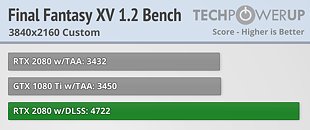- Joined
- Mar 25, 2009
- Messages
- 9,824 (1.69/day)
- Location
- 04578
| System Name | Old reliable |
|---|---|
| Processor | Intel 8700K @ 4.8 GHz |
| Motherboard | MSI Z370 Gaming Pro Carbon AC |
| Cooling | Custom Water |
| Memory | 32 GB Crucial Ballistix 3666 MHz |
| Video Card(s) | MSI RTX 3080 10GB Suprim X |
| Storage | 3x SSDs 2x HDDs |
| Display(s) | ASUS VG27AQL1A x2 2560x1440 8bit IPS |
| Case | Thermaltake Core P3 TG |
| Audio Device(s) | Samson Meteor Mic / Generic 2.1 / KRK KNS 6400 headset |
| Power Supply | Zalman EBT-1000 |
| Mouse | Mionix NAOS 7000 |
| Keyboard | Mionix |
Square Enix has just updated their Final Fantasy XV Benchmark to version 1.2, adding support for NVIDIA's DLSS (Deep Learning Super-Sampling) technology. The new release will still allow users to test any graphics card(s) they have just as it did before. That said, owners of NVIDIA's RTX 2070, 2080, and 2080 Ti get the benefit of having access to DLSS for improved image quality and performance. NVIDIA claims that performance will improve by up to 38% with DLSS alone. In order to verify that we ran a few tests of our own to find out.
Preliminary testing was done using Corsair's Vengeance 5180 Gaming PC, which is equipped with an Intel i7-8700, 16 GB 2666 MHz DDR4 and an NVIDIA GeForce RTX 2080. At 3840x2160 with the highest possible settings, DLSS offered a 36% increase in performance. This is very close to NVIDIA's specified increase and within the expected margin of error. When compared to the older GTX 1080 Ti which was paired with a stock Intel i7-8700K, and 32 GB of 3466 MHz memory we see the GeForce RTX 2080 and GTX 1080 Ti offer roughly the same level of performance. Therefore DLSS really is the difference maker here allowing for better performance and image quality. It should also be noted both systems used the same NVIDIA 416.94 WHQL drivers.



Looking at the benchmarks running side by side, to my eyes at least NVIDIA's DLSS solution offers slightly better image quality than just using TAA, but this may well be subjective and will depend upon the user to some degree. Even so, with the ceasing of development on Final Fantasy XV is seems unlikely DLSS will be fully implemented into the game, all we can do for now is hope. With that said, if you are running an NVIDIA GeForce RTX series graphics card give the benchmark a try by downloading it at the source below, and let us know your thoughts and results in the comments.
View at TechPowerUp Main Site
Preliminary testing was done using Corsair's Vengeance 5180 Gaming PC, which is equipped with an Intel i7-8700, 16 GB 2666 MHz DDR4 and an NVIDIA GeForce RTX 2080. At 3840x2160 with the highest possible settings, DLSS offered a 36% increase in performance. This is very close to NVIDIA's specified increase and within the expected margin of error. When compared to the older GTX 1080 Ti which was paired with a stock Intel i7-8700K, and 32 GB of 3466 MHz memory we see the GeForce RTX 2080 and GTX 1080 Ti offer roughly the same level of performance. Therefore DLSS really is the difference maker here allowing for better performance and image quality. It should also be noted both systems used the same NVIDIA 416.94 WHQL drivers.



Looking at the benchmarks running side by side, to my eyes at least NVIDIA's DLSS solution offers slightly better image quality than just using TAA, but this may well be subjective and will depend upon the user to some degree. Even so, with the ceasing of development on Final Fantasy XV is seems unlikely DLSS will be fully implemented into the game, all we can do for now is hope. With that said, if you are running an NVIDIA GeForce RTX series graphics card give the benchmark a try by downloading it at the source below, and let us know your thoughts and results in the comments.
View at TechPowerUp Main Site





